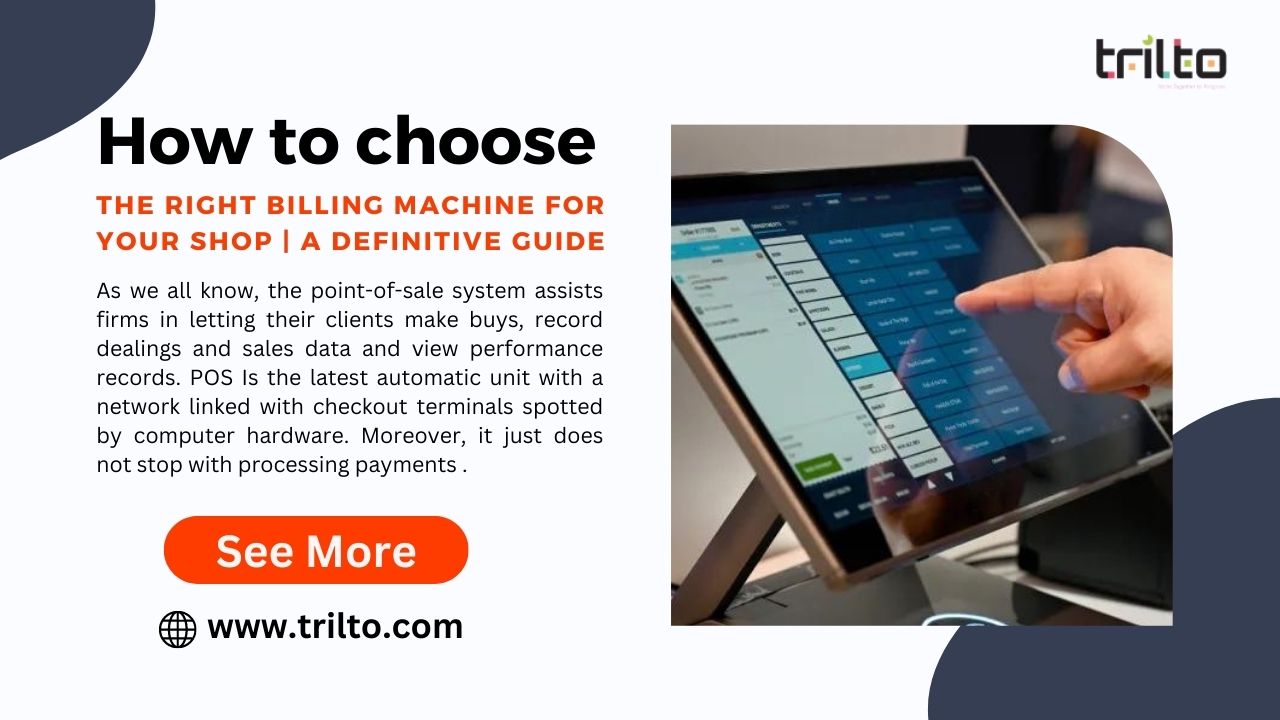Table of content.
- What problems does a POS system solve?
- Identify your business types or category.
- How a POS system benefits a shop owner.
- Suitable pricing according to your business.
- FAQ.
As we all know, the point-of-sale system assists firms in letting their clients make buys, record dealings and sales data and view performance records. POS Is the latest automatic unit with a network linked with checkout terminals spotted by computer hardware. Moreover, it just does not stop with processing payments but also allows smooth business operations by utilising the data collected from each trade. In addition, it will help firms with clients, workers, inventory data management, and many more. In this blog, we will find out more about the POS system.
What problems does a POS system solve?
There are a large number of reasons to use POS systems as it will help in reducing numerous problems that businesses have been facing for a long time ago. Here are some of the problems that POS systems help in solving:
Reduces time and costs
Point of sale lets a client have speedy checkout processing by easing their worries. A helpful POS system stops the long duration of line up up at the payment counter and processes valid and quick check out. It is also possible to tag items with barcodes and scan them with an iPhone or iPad that has a credit or debit card reader that is compatible with the item.
The use of POS Inventory Software ensures efficient inventory management processes. It stops undue inventory transfers due to the high level of accuracy and efficiency. There is no doubt that it is one of the best systems to implement to cut costs and save period at the same time.
Reduces worries about use
There is no doubt that you can greatly improve the functionality of your company using POS.
One of the best ways is by picking a cloud-based system that enables you to run the firm and recover useful data and reports from any location and device whenever you want.
Moreover, employees can make the most of a POS system’s useful functionality if it is simple. Unlike classic cash registers, which are very difficult to use, however, POS systems are designed to be as helpful as likely to firms with certain sectors.
Therefore, it is wise to perform as much research upfront as possible to determine whether or not a POS system has been created specifically for the sector in which your firm operates.
For example, there will be those designed especially for retail stores that will include inventory management features. In contrast, those designed for use in restaurants will have large interfaces that will make it easier to book a table when the environment is dark.
Reduces human error
Thanks to POS inventory management systems, businesses can have multiple locations and track inventory reliably without being physically present. POS Inventory software makes it easy to find data without receipts, find transactions, and calculate bills automatically. In both billing and returns, it reduces human error.
Some of these software programs are equipped with a prompt payroll processing feature.
Reduces bad links with costumers
Customer service is the backbone of your business. Loyal customers are more likely to buy. To do this, you need a loyal customer base. Is there a way to distinguish loyal customers from new ones among all the waves of customers?
The POS system’s customer Relationship Management (CRM) will help you here. With this feature, you can reward, promote, discount, or refer your valuable clients to keep them returning.
Reduces the use of cash
Technology keeps evolving, and so do payment methods. It’s old-fashioned and outdated to carry cash around. Most people prefer to use credit or debit cards, e-wallets, UPI, etc., instead of cash.
When you use POS software, you can accept various payment methods, whatever your patrons like.
You’ll get more sales if you accept easy payments, making your customers return.
Identify your business type or category
· Desktop POS system
They run on laptops or desktop computers on a browser, an app, or on-premises. It has a drawer, barcode scanner, and card reader like a cash register.
Businesses with high volumes, like restaurants, fashion stores, bookstores, grocery stores, salons, and spas, can benefit from desktop POS systems.
· Mobile POS system
Mobile POS systems are smaller than and just as handy as desktop POS systems. It consists mostly of a phone app and a card swiper. It’s just a matter of turning on your POS and selling. You can also get barcode scanners or receipt printers.
Mobile POSs don’t take up much space, so they’re portable, and you can ring up sales wherever you are. Many small businesses, like freelancers, street vendors, or event/fair vendors, use mobile POS.
· Tablet POS systems
Tablet POS systems work just like mobile POS systems. In both systems, receipt printers, and card readers are attached to devices. Tablet POS differs from mobile POS because tablets are usually much bigger (in size), so their screens are bigger, and their images are sharper and more colourful.
Businesses with a lot of lists would benefit from this retail POS system. Employees and customers both love it because it makes ordering and buying easier. Tablet POS systems are more famous among businesses with controlled resources. For instance, there are gift shops, art galleries, and coffee shops.
· Self-service kiosk POS systems
It’s a desktop POS with extra security, so all dealings are one-sided, and risks are reduced. Self-service kiosks let customers buy things themselves without help from employees. It’s about saving money and manpower for businesses with a self-service POS.
Clients can schedule and buy tickets at self-service kiosks POS in movie theatres. Or in grocery stores, where customers can check prices and checkout themselves. The self-service retail point of sale is often used for parking, checking patients in, and selling tickets.
How a POS system benefits a shop owner?
o An easy way to invoice
Point of soft sales software enables you to group and record your invoices. There are many types of invoices to manage in a company. It is vital to differentiate between them easily. Moreover, with this software, you can easily find the invoice for buys, sales, repairs, orders, and others relying on the software.
Easy inverse management is especially vital for your analysis operation. This is proof that you have sold a product or a service. This billing in voice contains important details for the buyers, such as the number of goods sold, the description of goods and the transaction values.
It would be complex to perform this follow-up manually. As a result, the point of sale accelerates generating invoices, recording buying information, and selling.
o Accurately generate reports
Point of sale reports with critical information will automatically be generated based on the history of the store transactions. Managers can use this function to see how their business is doing. Managers can use reports to identify areas of needless spending or show common sales trends.
o Protect customer data
One of the benefits of POS systems is this. It protects customer data. A POS lets you pay with your debit or credit card when you purchase. It gives you complete security of your customer’s financial info. Thus, making a good impression and building trust immediately.
The POS machine usually comes from the retailer’s bank, and the POS system just saves the transaction details. Both the customer and the bank keep the card info and password secure.
o Management of customer orders
POS systems let you order regardless of whether you have the product in stock. You don’t have a specific electric trimmer in stock, for example. Still, you can add that order to your catalogue soon with a smart POS system. The order should be associated with the customer who placed the order. Therefore, if and when that electric trimmer becomes available, your sales representative can contact the customer to inform him of the availability.
Suitable pricing according to your business.
The cost of point of sale machine can vary depending on the type of business, machine, and its features. But on average, a simple POS machine can cost around INR 2000-7000. The simple machines have basic features such as a card reader, reporting capabilities, and a thermal printer.
The advanced POS machine will cost around INR 8000-15000. This is because they have additional features such as a touch screen, inventory management system, and Barcode Scanner.
It depends on which machine you want to buy according to your business.
FAQ.
What types of businesses can use a POS billing machine?
A retail store, petrol pump, shop, or business POS machine accepts online payments. In an instant transaction, POS machines provide smooth and secure online payment, keeping customers and businesses safe.
What features should I look for in a POS billing machine?
Ease of Use, Hardware, Software, Integration, Automation, PCI Compliance, Support, and Cost are some things you should consider when buying a POS machine.
How much does a POS billing machine cost?
The cost may vary depending upon the company models, ranging between INR 3000-17000.
Do I need special training to use a POS billing machine?
Special training is needed to use a POS billing machine as you have to handle the cash counter of any business.
What support and maintenance are required for a POS billing machine?
You can contact the expert team if you face difficulty operating your POS machine.
Summary,
This blog is about choosing the right billing machine for your shop, as POS systems nowadays are becoming too famous due to their ease of use and many more vital functions. Then why are you waiting for more?
Buy the POS billing machine and take your business to the next level.

